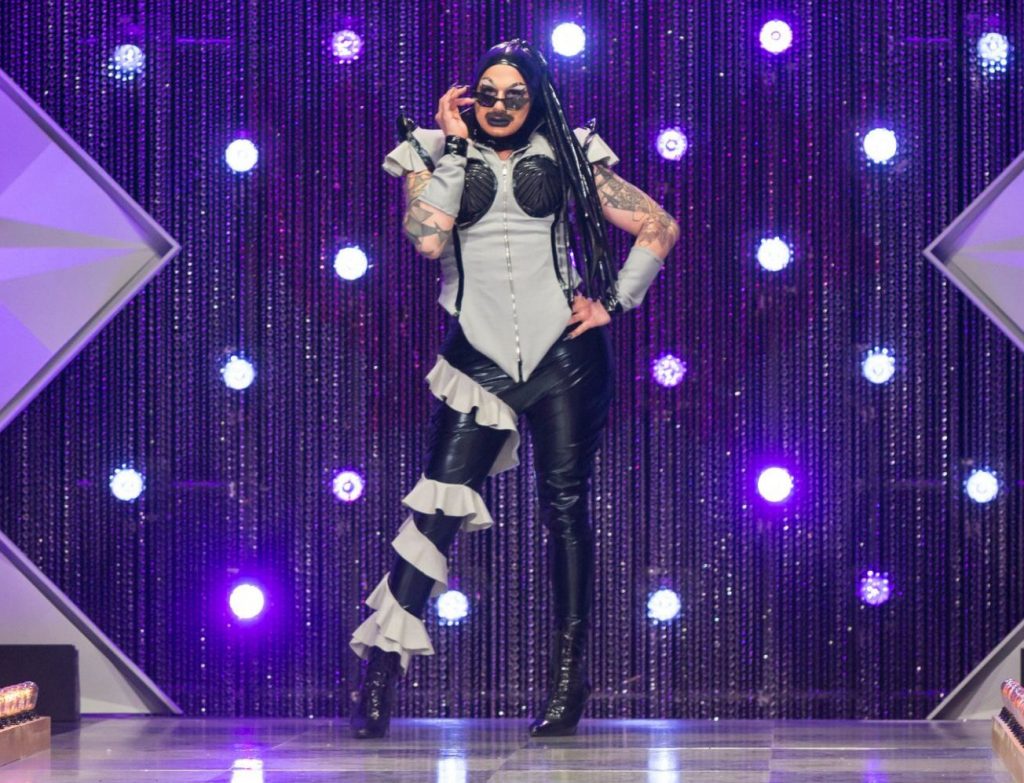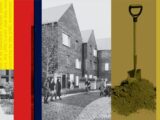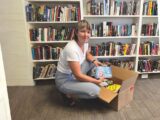Halal Bae has always been a weirdo — or as she calls it, a “queer-do.” When she walked down the runway on season three of Canada’s Drag Race this summer, the Toronto-based drag performer held tight to her roots. While other contestants wore bright, trendy garments for the week’s streetwear and catwalk couture challenges, Bae sported a look inspired by Toronto’s infamous raccoons, paying homage to the real rulers of her city.

But Bae has never been drawn to the crowd-pleasing, femme-focused drag scene that dominates The Village, Toronto’s historic LGBTQ2S+ neighbourhood. She got her start in the queer bars of the city’s west end, surrounded by alternative drag queens who staged edgier, more story-driven performances.
You may unsubscribe from any of our newsletters at any time.
Those venues were a perfect fit for Bae, a visual artist whose work unpacks themes of politics and social justice. Through drag, Bae explores her experiences as a queer person who grew up in a Muslim family in the Middle East.
View this post on Instagram
“What I really want to put out there is this idea that no matter who you are, what your background is and where you come from, you can be this awesome, queer, free person who can meld all facets of your personality and create an intersectional space where that can thrive,” said Bae. “It doesn’t have to be one thing or the other.”
Bae’s identity informs her drag, from her performances at Toronto’s now-shuttered queer bar The Beaver to her appearance on Canada’s Drag Race. The Egyptian-Palestinian performer has drawn praise on social media for bringing Muslim and Middle Eastern representation to the show.
“It has lit an even bigger fire under me and given me the confidence to be able to really put forward my beliefs and speak about the issues that really matter to me, without any hesitation,” said Bae.
Bae’s elimination in week one surprised fans and commentators — but she didn’t pass up the opportunity to turn the moment into a political statement. Shortly after the first episode aired, Bae took to Twitter to compare her being “robbed” of victory to Israel’s occupation of Palestine.
Did I get “robbed”? That’s the clear consensus, but we’re used to it. Just ask my grandmother. #freepalestine ?? #settlercolonialism #racism #canadasdragrace
— Halal Bae (@TheHalalQueen) July 16, 2022
Bae has come to be known for her “dragtivist” performances. From defending trans rights to combating stereotypes of Middle Eastern people, Bae frequently blends social commentary with creative, conceptual acts. She’s been outspoken about her pro-Palestinian views, wearing a dress with the phrase “Stop displacing us” in a trailer for season three of Canada’s Drag Race and frequently tweeting about the subject.
In the summer of 2019, Bae performed at Toronto Pride’s annual Drag Ball, criticizing Toronto police’s failure to protect the predominantly racialized, queer men murdered by serial killer Bruce McArthur. “That was one that really meant a lot to me,” said Bae. “A lot of these people came from the same places that I come from — they were immigrants as well, and they really don’t have any family here, same as I do. That could have been myself and a lot of the people that I consider friends.”
View this post on Instagram
But she has long been outspoken about social issues. Born in Egypt and raised in Kuwait, Bae moved to Canada at 18. When she arrived in Montreal, she faced discrimination from both Middle Eastern and queer communities. She was ostracized for either being queer and progressive, or for being an immigrant from a Muslim family from the Middle East.
“I had to choose between my identities,” Bae said. “I had the luxury to be able to do that, because of the way that I look and because of my skin tone, but that’s not a luxury that a lot of my friends were afforded.”
The struggle to find a happy medium between her queerness and her culture became an important influence on Bae’s drag. Bae decided to ground her persona in her heritage, turning to seasoned drag performer Phoenix Inana for help.
The two met as high school students in Kuwait, where they became best friends and coincidentally moved to Montreal six months apart. Inana — who performs under the drag names Slick Hardwood and Horus Ben Sharmuta — became Bae’s drag mother, serving as a valued mentor.
“Being Egyptian is very complicated. Being a Muslim-born person with Halal’s experience, gender identity and sexual preference is very difficult,” said Inana. “We know how toxic some of the values we were raised with and some of the obstacles that we’ve had to face are, so we became family.”
View this post on Instagram
Together, Bae and Inana used drag to reimagine their own histories through a queer lens. It was a novel approach to the art form, says Inana. “There was not enough force and support for people of our ancestry in the scene at all,” they said. “They weren’t visible and they weren’t represented — and when they were, they weren’t connected in a safe enough way to produce art that was holistic.”
Bae and Inana began incorporating their Egyptian origins into their drag looks, dressing as cultural icons including Cleopatra and the ancient Egyptian god Anubis. When Inana began tattooing their face for their performances, reclaiming a Bedouin practice that was interrupted by colonial forces and has become taboo, Bae took part too.
View this post on Instagram
Bae’s moustache became a staple of her drag persona. For her, the feature emphasizes her gender queerness while honouring her body hair. “It shows that there isn’t a finite or exclusive way of how drag should be presented,” said Bae. “You can look extremely bodied and have hairy features, and still be a beautiful woman.”
Bae also wants to create safe spaces for underrepresented performers. Tired of seeing cisgender white men dominate the alternative drag scene and the broader queer community, she created Living in Colour, a monthly queer dance party spotlighting Toronto’s budding queer and trans performers of colour.
More on Broadview:
- ‘I say with pride that I am from the favela’
- Gay bars are disappearing
- ‘Jesus’ Coming Out Celebration’ queers up Palm Sunday
“I wanted to really put a focus on all these marginalized folks who are my friends — the people that I grew up with, the people that I created a community with,” said Bae. “We weren’t given the spaces to express ourselves and to be free of harassment.”
Bae joined a wave of drag performers who are Black, Indigenous and people of colour (BIPOC) in speaking out against racism and transphobia in Toronto’s performance spaces. She’s since built her own drag family, Haus Bae. Through her drag house, Bae encourages young BIPOC performers to lean into their identity and culture and highlight social concerns.
View this post on Instagram
Rhinestone Chickadee, one of Bae’s drag daughters, says Bae has inspired her to consider tapping into her background and speaking about Indigenous issues. “Part of what we do in our house is not just pulling up looks and sick performances,” said Chickadee. “We also use the platform to talk about things that are important to us.”
Bae’s second drag daughter, Bombae, made it into week six of Canada’s Drag Race before being eliminated. “I couldn’t be more proud of what she’s been doing, and what my other daughter has been doing as well in the city,” said Bae. “Just being able to be a small part of a growing movement of young, BIPOC, queer artists is something that’s really, really special.”
I couldn’t be more proud of @ItsBomBae journey on drag race! She slayed every runway and brought us so much charisma it’s impossible not to love her. You’re an icon star skinny legend and can’t wait to see you soar you amazing creature. Love you ❤️❤️ mutha
Pic: @julieriemersma pic.twitter.com/MXqoI14oMm— Halal Bae (@TheHalalQueen) August 19, 2022
As for what’s next, Bae says she hopes to run for political office. She’s begun reaching out to local advocacy groups, identifying community issues and building a platform. She hopes to bid for a provincial or federal NDP seat in the coming years. “I live in Toronto Centre, which is pretty much divided between a queer community and a Muslim immigrant community,” said Bae. “I think that I would be a good person to be able to represent a community like that.”
Bae separates her drag persona from her personal life and day job. While she doesn’t see herself becoming a full-time performer, Bae says she isn’t leaving the drag scene anytime soon. “For me, drag is used as a political tool, as a means of expressing my artistic practice, of community-building,” she said. “Drag will always be a part of my life.”
***
Tobin Ng is a writer in Ottawa and was one of Broadview’s summer interns.














